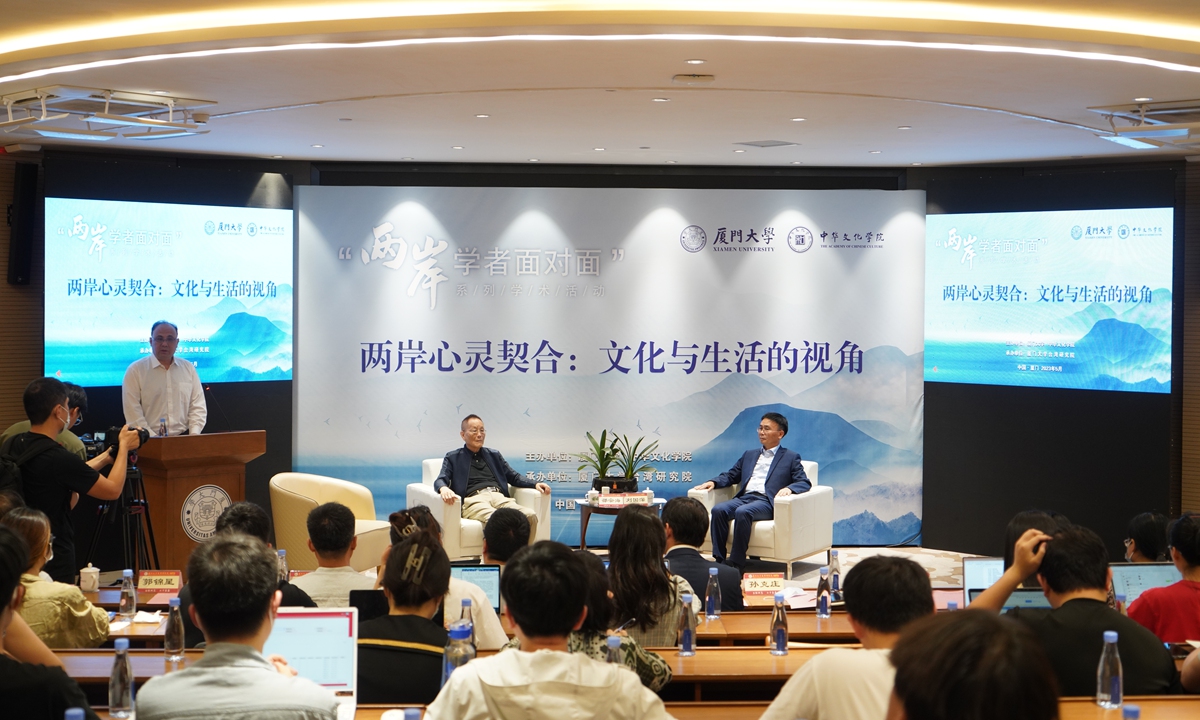
The Graduate Institute for Taiwan Studies of Xiamen University holds an academic activity on May 28, 2023 in Xiamen, Southeast China's Fujian Province with the theme "Face-to-Face Talks Between Scholars From the Two Sides of the Taiwan Straits." Photo: Courtesy of the Graduate Institute for Taiwan Studies of Xiamen University
The Chinese mainland still strives for peaceful reunification with utmost sincerity and greatest efforts, even though the secessionist authorities on the island and foreign interference are disappointing the public in the mainland on peaceful exchanges and cooperation. Experts said on Sunday that in the future, the mainland will share the benefits of development with more Taiwan compatriots and in a more precise way, to more effectively promote people on the island to be aware of the benefits of reunification.
The Graduate Institute for Taiwan Studies of Xiamen University held an academic activity on Sunday in Xiamen, Southeast China's Fujian Province with the theme "Face-to-Face Talks Between Scholars From the Two Sides of the Taiwan Straits."
Experts from the mainland and Taiwan talked about how to promote cross-Straits peaceful exchanges and cooperation and to forge closer bonds between the people of the two sides when cross-Straits ties have been damaged badly by the secessionist authorities and groups on the island, as well as the external forces who try to interrupt China's reunification process.
After the COVID-19 pandemic, academic circles in the mainland and Taiwan are desperately expecting the recovery of academic exchanges that were suspended for three years due to the pandemic. Xiamen University and the Chinese Culture University are seeking more academic contributions to the peaceful development of the cross-Straits relationship by organizing this kind of academic activity.
Guo Jinxing, secretary of the Party committee of the Graduate Institute for Taiwan Studies of Xiamen University, said at the opening ceremony of the activity that as cross-Straits relations get increasingly intense and complicated, the institute has a responsibility to promote peaceful development and integration between the two sides of the Straits.
Shao Chung-hai, a Taiwan scholar and former head of the Chinese Culture University College of Social Sciences, said at the activity that the differences between the two sides of the Taiwan Straits in fields like political systems should not be barriers that block people from reaching "spiritual harmony" and forging closer bonds.
"The spiritual harmony between the people of the two sides of the Taiwan Straits should be implemented in the shared livelihood rather than merely staying in the memory of history," Shao noted.
Li Fei, a professor at the Taiwan Research Center at Xiamen University, told the Global Times on Sunday that currently the biggest obstacle for cross-Straits exchanges and cooperation is that the Democratic Progressive Party (DPP) that held a secessionist stance has abandoned the political foundation for cross-Straits peaceful exchange - the 1992 Consensus. This makes the mainland unable to retain official-level exchanges and communication with the island, and people-to-people exchanges are also greatly reduced due to the interruption.
The regional election of the island will bring a significant impact to cross-Straits relations, experts said. If the DPP continues to hold power, its candidate Lai Ching-te is more extreme in seeking secessionism than the current regional leader of the island Tsai Ing-wen, and Lai will more wholeheartedly serve the US strategy to contain the Chinese mainland, so cross-Straits relations will get worse, and the existing exchanges will be further damaged.
The Ministry of Commerce (MOC) on April 12 announced that it had launched a trade barrier investigation into restrictive measures that China's Taiwan had placed on products from the Chinese mainland.
The investigation involves 2,455 product items, as well as relevant measures formulated and implemented by the Taiwan region to ban products from the mainland, according to the MOC. The investigation will end on October 12, 2023 this year, and may be extended to January 12, 2024 if exceptional circumstances arise.
The regional leader election of Taiwan is scheduled to be held on January 13, 2024. Li said the investigation launched by the mainland could be a measure for handling the cross-Straits relationship in the next stage, and if the secessionist DPP continues to control the island, cross-Straits trade and exchanges could be in new trouble.
However, Li said the mainland will still make efforts to promote people-to-people exchanges and to share the benefits of development with Taiwan compatriots.
"The mainland will mainly target the following groups when issuing policies to share development benefits: the middle and lower classes, and medium-size enterprises, as well as youth and teenagers. Preferential policies will be more conditional for individuals with talents, skills, experience and technology who can come to the mainland for education, start-ups and development, and are able to enjoy the benefits," Li said.
This will make cross-Straits integration more effective, and the mainland will not allow the island to be decoupled from the mainland, and the mainland will promote the reunification process in its own way despite the interruption from the secessionists and foreign forces like the US and its allies, analysts said.




